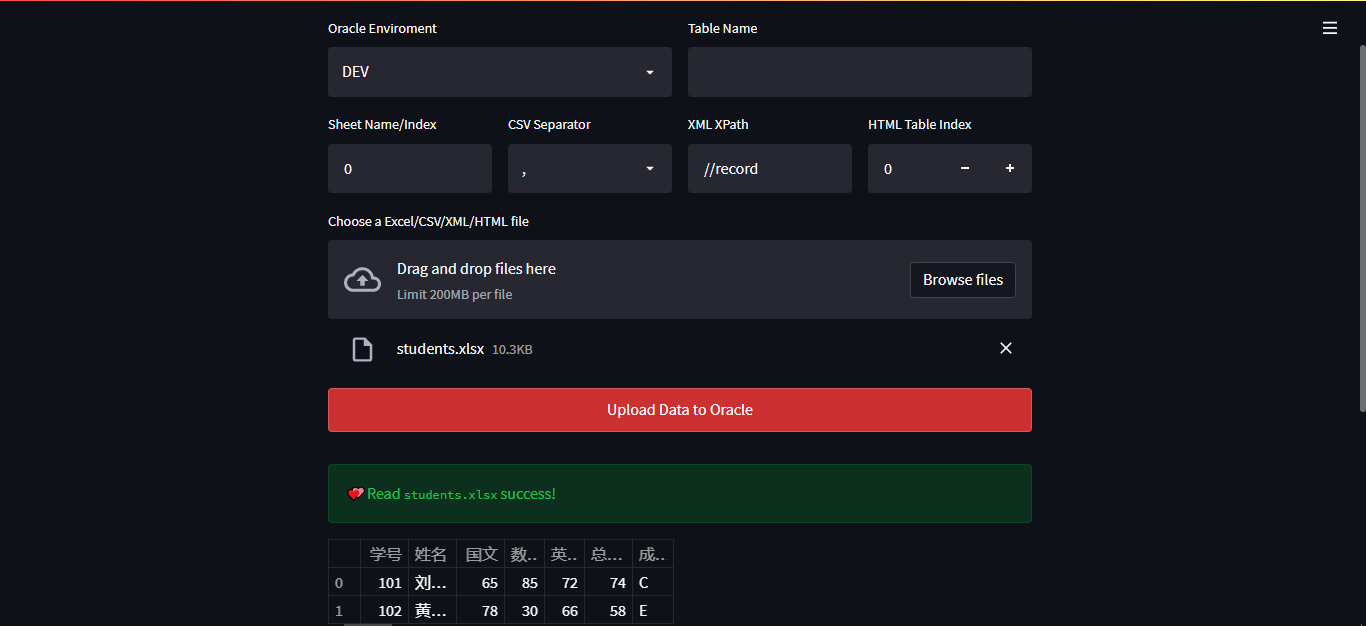1
2
3
4
5
6
7
8
9
10
11
12
13
14
15
16
17
18
19
20
21
22
23
24
25
26
27
28
29
30
31
32
33
34
35
36
37
38
39
40
41
42
43
44
45
46
47
48
49
50
51
52
53
54
55
56
57
58
59
60
61
62
63
64
65
66
67
68
69
70
71
72
73
74
75
76
77
78
79
80
81
82
83
84
85
86
87
88
89
90
91
92
93
94
95
96
97
| import os
import pandas as pd
import streamlit as st
from sqlalchemy import create_engine
from sqlalchemy.dialects.oracle import VARCHAR2
col1, col2 = st.columns(2)
with col1:
env = st.selectbox('Oracle Enviroment', ('DEV', 'TEST', 'PROD'))
if env in ('DEV', 'TEST'):
conn_string = f'oracle+cx_oracle://apps:apps@{env}'
elif env in ('PROD'):
conn_string = f'oracle+cx_oracle://apps:serapps@{env}'
engine = create_engine(conn_string, echo=False)
with col2:
tablename = st.text_input('Table Name', '')
col1, col2, col3, col4 = st.columns(4)
with col1:
sheet_name_index = st.text_input('Excel Sheet Name/Index', '0')
try:
sheet_name = int(sheet_name_index)
except:
sheet_name = sheet_name_index
with col2:
csv_separator = st.selectbox('CSV Separator', (',', '|', ':'))
with col3:
xpath = st.text_input('XML XPath', '//record')
with col4:
table_index = st.number_input('HTML Table Index', value=0)
uploaded_files = st.file_uploader(
'Choose a Excel/CSV/XML/HTML file', accept_multiple_files=True)
is_upload = st.button('Upload Data to Oracle')
st.markdown("""
<style>
div.stButton button:first-child {
background-color: rgb(204, 49, 49);
width: 100%;
color: #fff;
padding: 8px;
}
</style>""", unsafe_allow_html=True)
if is_upload:
for uploaded_file in uploaded_files:
filename = uploaded_file.name
basename, extension = os.path.splitext(filename)
if not tablename:
tablename = basename.lower()
if extension in ('.xls', '.xlsx'):
df = pd.read_excel(
uploaded_file, sheet_name=sheet_name, keep_default_na=False, engine='openpyxl')
elif extension in ('.csv', '.txt'):
df = pd.read_csv(
uploaded_file, keep_default_na=False, sep=csv_separator)
elif extension in ('.xml'):
df = pd.read_xml(uploaded_file, xpath=xpath)
elif extension in ('.html'):
data_lists = pd.read_html(uploaded_file)
df = pd.DataFrame(data_lists[table_index])
else:
f'Unknown file format `{extension}`'
dtype = {c: VARCHAR2(1000)
for c in df.columns[df.dtypes == 'object'].tolist()}
st.success(f'💕Read `{filename}` success!')
st.write(df.head())
df.to_sql(tablename, con=engine, index=False,
if_exists='append', dtype=dtype, chunksize=10**4)
st.success(f'💕Upload `{filename}` success!')
'***'
|
